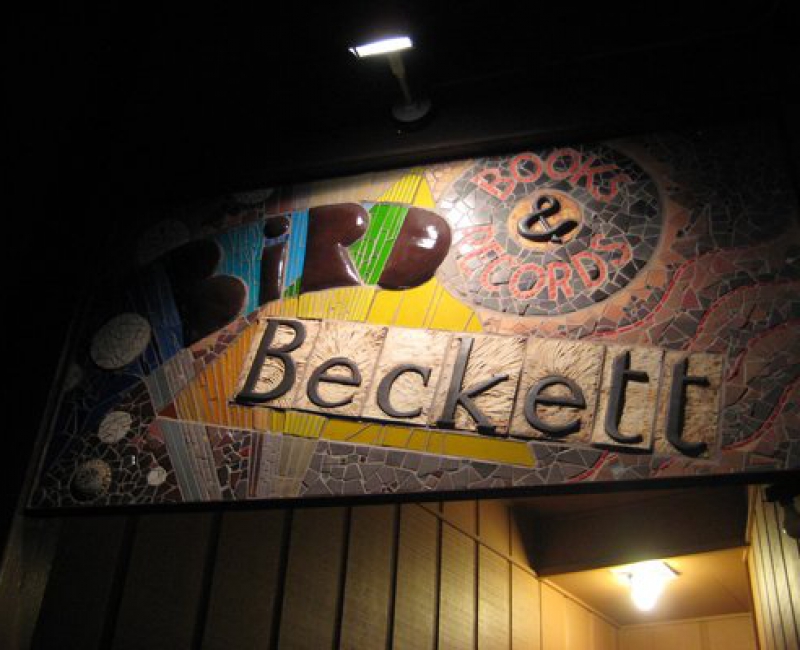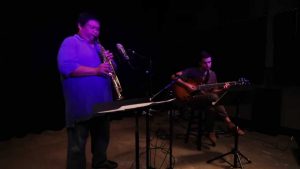Live Streaming every show!
Refresh your browser to catch a show in progress!
Visit our Facebook page or YouTube channel!
But nothing beats being in the room with the music & the musicians!
Help us pay the band!
653 Chenery Street in San Francisco's Glen Park neighborhood
Open to walk-in trade and browsing Tuesday to Sunday noon to six
phone: 1-415-586-3733 email: [email protected]
A guitarist and tenor sax player explore the music of a great American songwriter.
Click on the photo below for their version of “Listen to Your Heart.”
From the website www.alecwildermusicandlife.com
Jazz musicians fascinated Wilder with their gift for creating extemporaneous compositions. Among those for whom he composed major works were Marian McPartland, piano; Stan Getz, Zoot Sims and Gerry Mulligan, saxophone; Doc Severinsen and Clark Terry, trumpet. Entire albums of his songs and shorter pieces were recorded by Bob Brookmeyer, trombone; Roland Hanna and Marian McPartland, piano; Dave Liebman and Bob Rockwell, saxophone; Robert Levy, trumpet and Vic Juris, guitar. Individual Wilder songs have been recorded, notably by such jazz artists as Stan Getz, Chet Baker, George Shearing, Keith Jarrett, Kenny Burrell, Maynard Ferguson, Bill Dobbins, Fred Hersch and Bill Charlap.
Wilder’s relationship with popular and jazz singers was especially close. Despite his songs’ sinuous angular melodies and unorthodox forms, he was admired and respected not only by Frank Sinatra, Mabel Mercer, Mildred Bailey, Peggy Lee and Tony Bennett, for whom he wrote songs, but by Marlene VerPlanck and Jackie and Roy, who recorded Wilder albums. Among his best-known songs are It’s So Peaceful in the Country, I’ll Be Around, While We’re Young and Blackberry Winter.
From the same site:
Alec Wilder’s music is a unique blend of American musical traditions – among them jazz and the American popular song – and basic “classical†European forms and techniques. As such, it fiercely resists all labeling. Although it often pained Alec that his music was not more widely accepted by either jazz or classical performers, undeterred, he wrote a great deal of music of remarkable originality in many forms: sonatas, suites, concertos, operas, ballets, art songs, woodwind quintets, brass quintets, jazz suites – and hundreds of popular songs.
Many times, his music wasn’t jazz enough for the “jazzers,†or “highbrow,†“classical,†or “avante-garde†enough for the classical establishment. In essence, Wilder’s music was so unique in it’s originality that it didn’t fit into any of the preordained musical slots and stylistic pigeonholes. His music was never out of vogue because, in effect, it was never in vogue. It’s non-stereotypical specialness virtually precluded any widespread acceptance.
In his book, “Alec Wilder and His Friends,†Whitney Balliett dubbed Wilder “The President of the Derriere Garde,†and to many classical critics he was a “conservative craftsman lacking in innovation†and not to be taken seriously. Irving Kolodin, a champion of Wilder’s music, commended his native urban style, lamenting that it never became “politically fashionable,†as did the music of many of his contemporaries.
Wilder, at his best, represents a fascinating amalgam of three quite different composer-archetypes, here all rolled into one: Gershwin, Poulenc, Villa-Lobos. In its baldest outlines, Wilder’s oeuvre is unusually diverse and characteristically American, a synthesis of the brilliant song writer (Gershwin); the not-too-intellectual, traditional and determinedly conservative composer of easily accessible American-style Gebrauchsmusik, making use of popular and jazz elements as a matter of course (Poulenc); and a sometimes uncritical, too-casual writer who writes too much too easily – like Shakespeare’s old bromide about loving too well but not wisely (Villa-Lobos).
Alec Wilder (February 16, 1907-December 24, 1980) was born Alexander Lafayette Chew Wilder in Rochester, New York. He studied composition and counterpoint privately at the Eastman School of Music, but as a composer was largely self-taught. As a young man, he moved to New York City and made the Algonquin Hotel — that remarkable enclave of American literati and artistic intelligentsia — his permanent home, though he traveled widely and often.
TAKE OUR SURVEY
To take our SURVEY, click here, and help the BBCLP get to know you better! As Duke Ellington always said, we love you madly...
The Bird & Beckett Cultural Legacy Project

Our events are put on under the umbrella of the nonprofit Bird & Beckett Cultural Legacy Project (the "BBCLP"). That's how we fund our ambitious schedule of 300 or so concerts and literary events every year.
The BBCLP is a 501(c)(3) non-profit...
[Read More ]
The Independent Musicians Alliance
Gigging musicians! You have nothing to lose but your lack of a collective voice to achieve fair wages for your work!
The IMA can be a conduit for you, if you join in to make it work.
https://www.independentmusiciansalliance.org/
Read more here - Andy Gilbert's Feb 25 article about the IMA from KQED's site






